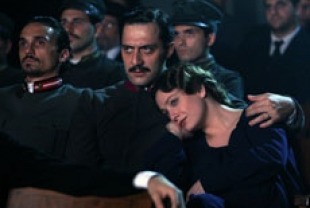Benito Mussolini was one of the first 20th century dictators to fashion a "cult of personality." Throughout the 1920s and 1930s, the Italian people were mesmerized by his charisma and influenced by his skillful use of the media as a propaganda tool. He was also a great believer in the righteousness of war which "alone brings up to its highest energy and puts the stamp of nobility upon the peoples who have the courage to face it." Although Italian filmmaker Marco Bellocchio (Good Morning, Night, My Mother's Smile) focuses in this operatic drama on the early life of Mussolini and the woman who fell under his spell, he also makes it clear that this power-hungry politician would do anything and use anyone to further his career and his vision of a strong and aggressive Italy that would stun the world and rise to a glory beyond the Roman Empire.
Benito Mussolini (Filippo Timi) in 1914 is an idealistic Socialist and editor of Avanti!. He wins the attention of his compatriots with an anti-clerical stance and then earns their ire when he comes out for the war against Germany. Ida Irene Dalser (Giovanna Mezzogiorno) is an enterprising young woman who runs a beauty salon in Milan. She is dazzled by Mussolini's charisma and his ardent dreams for Italy. They begin a passionate affair which gives her life flare and fresh purpose. When he is fired from Avanti! and expelled from the Socialist Party, she sells her apartment and beauty salon to finance the newspaper he establishes and which becomes the official organ of the National Fascist Party. He begrudgingly agrees to marry Ida in 1914 and on the eleventh of November she gives birth to Benito Albino Mussolini.
During World War I, Mussolini serves in the army, and Ida loses touch with him. When she finds him in a military hospital, she discovers he has betrayed her and married Rachele (Michela Cescon). This marks the beginning of a protracted war between Mussolini and Ida, in which he has the upper hand thanks to his rise to power and prestige in Italy as a Fascist leader of the nation.
As his first wife and mother of his first-born son, Ida protests this injustice and, for a while, lives with her sister under house guard. She tries to contact Mussolini, the Pope, and others but it is all to no avail. When Ida tries to assassinate one of the leader's close associates in 1926, she is arrested and committed to the lunatic asylum in Peregine and later to San Clemente. Her son is sent to a Catholic boarding school and given a Fascist guardian who deprives him of the name Mussolini.
Bellocchio has made a visually sumptuous film that also contains some memorable scenes including one in which Ida watches a Charlie Chaplin film, her eyes filling with tears when the character on the screen feels the pain of being separated from a child. In the end, we are left with a vivid portrait of Mussolini as an amoral man who at the start of the drama proclaims the non-existence of God in front of Catholics and later unites with the Pope and the Vatican. He is a demagogue only committed to his lunatic vision of national glory for Italy. And, despite her crusade to reveal the truth about her identity and that of her beloved son, Ida is delusional in her fantasy that her one-time lover will do what is right. Vincere reveals the darkness that dogs both power-hungry leaders and lovers who tell themselves stories that have no resemblance to reality.
